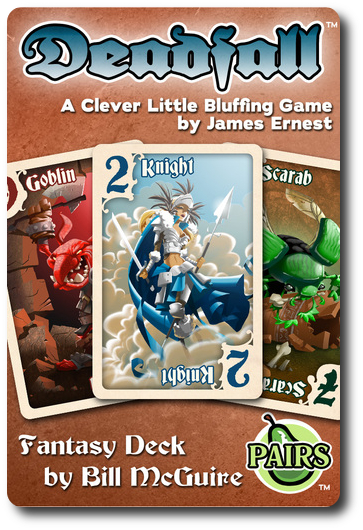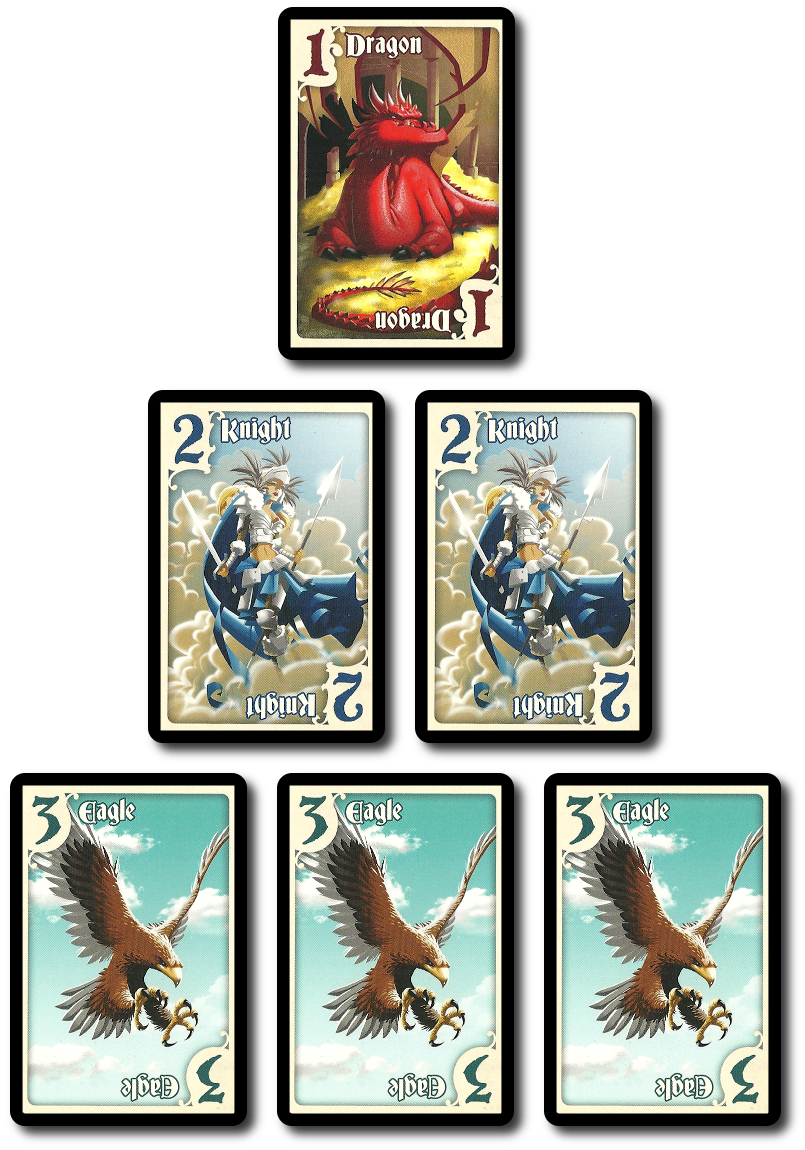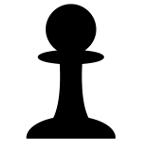
The Basics:
- For ages 6 and up
- For 2 to 7 players
- Approximately 5 minutes to complete
Geek Skills:
- Active Listening & Communication
- Counting & Math
- Logical & Critical Decision Making
- Memorization
- Risk vs. Reward
- Hand/Resource Management
- Bluffing and Misdirection
Learning Curve:
- Child – Easy
- Adult – Easy
Theme & Narrative:
- There is no reward without risk
Endorsements:
- Gamer Geek mixed!
- Parent Geek approved!
- Child Geek approved!
Overview
To obtain power, one must take risks. There are others who seek the same prize as you and are just as willing to risk it all. This makes the prize all the more precious and dangerous. To the victor will go all the spoils. For those who are defeated, a shallow grave is their only reward, but such is the fate of all who reach too far and fall.
Deadfall, designed by James Ernest and published by Cheapass Games, is comprised of 55 cards. The cards are as thick and as durable as your standard playing card. The illustrations by Bill McGuire set the game in a fantasy world. Bright and colorful, and yet strangely dark and dangerous, Mr. McGuire has done a great job of capturing the wonder and perils of a fantasy adventure. Not included with the game, but necessary to play, is some sort of method of keeping track of how much betting power each player has. Poker chips, small coins, and even jelly beans will work. Each player will need 50 of whatever betting chips you elect to use.
Preparing for the Adventure of a Short Lifetime
Note: These steps are used to set up the game’s first hand and all subsequent hands.
To set up and begin the game, first have each player ante 1 betting chip to the center of the playing area. This area is refereed to as the “pot”. If a player cannot pay the ante, they cannot play at this time (unless a really nice friend wants to spot them a betting chip).
Second, shuffle the deck of cards and deal 6 cards to each player, face-down. If only playing with 2 players, give each player 7 cards. If playing with 7 players, give each player 5 cards. Players should look at their hand but keep it hidden from opponents.
Third, each player now selects 1 card in their hand to be the “Door” card. The Door card is placed face-down in front of the player. When all of the players have placed their Door card, they reveal them simultaneously. The player with the lowest valued Door card will go first with the turn order sequence going clockwise. The Door cards are out for the duration of the hand.
Adventure, Conquest, and Lots of Bluffing
Deadfall is played in hands and an unspecified number of turns. On a player’s turn, they will have to select one option out of a possible two.
Option One: Play a Card
If the player elects to play a card, they select 1 from their hand and place it in front of them, face-up. Let’s call this the player’s “Stack”. All subsequent played cards are placed on top of the previously played cards in the Stack in a way that the values of all the cards are clearly visible to all the players. However, the order in which the cards were played must be maintained. This means the very first card played will always be on the bottom and the most recent card played is always on top. From the very first card to the very last, the values are all visible.
Caution should be taken here. When the player plays a card, they are betting that at least 1 card of the same played rank is still in an opponents’ hand (or their own). The player needs to take into account how many cards of a certain rank have already been played and how many cards are left to play in the hand. If they are not careful, they will be called out (which may or may not be a bad thing depending on how devious the player is).
This ends the player’s turn and the next player in turn order sequence now goes.
Option Two: Announce a Dead Card
If the player elects to end the hand, they point to any opponent, calling them out (they cannot call themselves out), and announce the top-most card in their Stack is “Dead”. Announcing a card is “Dead” means that no more cards of that specific rank are available to play.
Each card in the game has a rank value, ranging from 1 to 10. The number of cards in each rank is equal to the rank value. For example, there is 1 card for rank 1, 2 cards for rank 2, 3 cards for rank 3, and so on.

When a player announces a card is “Dead”, they are saying that all the cards in that rank are already in play and none of the other opponents (including the player) have that rank card in their hand. This is, obviously, a gamble and a serious one.
The only restriction when it comes to calling out a player is that they can only call out the player who played the latest card in a series of same valued ranks. For example, if Player A and Player B both played a “5”, Player A cannot be called out because they have the older of the two 5 rank cards in play.
Bring Out Your Dead
When a player announces a “Dead” card, all players reveal their cards in their hand and a “Showdown” begins.
- If the “Dead” card is not in any player’s hand, the player who called the card wins the hand.
- If the “Dead” card is found in any player’s hand, the opponent who was called out wins the hand.
The loser now pays the winner a number of betting chips equal to the rank value of the “Dead” card. The winner also collects all the betting chips in the pot.
Continuing the Adventure and Victory
The game continues with a new hand after the “Dead” card has been resolved. The game itself can continue until only 1 player remains or a player has earned a certain number of betting chips. The rules do not specify, leaving it up to the players to determine how much or how little of their time they want to spend attempting to lie their way to victory.
Game Variants
A number of game variants are available if the players want to change the basic game play. Each are summarized here.
Blind Start
Instead of using the opening Door card to determine play order, it’s only used for the first hand and then never again. The winner of the previous hand is always the first player of the next hand without the benefit of knowing information upfront.
Breaking Nines and Tens
The first player to play a “9” must pay 1 betting chip to the pot. The first player to play a “10” must pay 2 betting chips to the pot. This game variant can also include breaking “8’s”, in which case, the first player to play an “8” must pay 1 betting chip, the first to play a “9” pays 2 betting chips, and the first to play a “10” pays 3 betting chips.
Cherry
If the called out player does not have the matching rank card necessary to save themselves from losing the hand, but other opponents (not the one who announced the “Dead” card) do, the called out player wins the hand and pays the other players with the matching rank card 1 betting chip each. This kickback is referred to as a “Cherry”.
Cold Dead Hand Calls
This is a twist in the normal way players call each other out. Instead of announcing a card “Dead” when it’s played to the Stack, the player announces the exact number of rank cards in the opponent’s hand. For example, “you have two “10’s”. The called player must then reveal their hand to the player who called them out. The winner gets the total number of betting chips equal to the number of cards in the called out player’s hand. That means a called out pair of “10’s” would equal 20 betting chips.
The Red Devil
After the initial “Door” card is revealed, each player passes 1 card to the opponent to their left, keeping the pass secret.
Pairs
Pairs is a simple betting game that can use the Deadfall deck. The complete rules for Pairs can be found online.
To learn more about Deadfall, visit the game’s web page.
Final Word
 The Child Geeks were very entertained by the game, mostly due to how fast it was played and how chaotic if felt at times. Deadfall had just the right amount of chaos, luck, speed, and depth to really tickle the Child Geeks’ fancy. According to one Child Geek, “What I like about this game so much is how fast it is. You have to pay attention, but each game isn’t long enough to tire you out.” Another Child Geek said, “It reminds me a lot of Liar’s Dice, but without the dice!” Of course the Child Geeks were frustrated at times and one even threw his cards up in the air when he was skunked early in the hand. But what kept them coming back was the speed and energy in the game. When all the Child Geeks had their fill of Deadfall, they voted to approve it.
The Child Geeks were very entertained by the game, mostly due to how fast it was played and how chaotic if felt at times. Deadfall had just the right amount of chaos, luck, speed, and depth to really tickle the Child Geeks’ fancy. According to one Child Geek, “What I like about this game so much is how fast it is. You have to pay attention, but each game isn’t long enough to tire you out.” Another Child Geek said, “It reminds me a lot of Liar’s Dice, but without the dice!” Of course the Child Geeks were frustrated at times and one even threw his cards up in the air when he was skunked early in the hand. But what kept them coming back was the speed and energy in the game. When all the Child Geeks had their fill of Deadfall, they voted to approve it.
 The Parent Geeks don’t necessarily like chaotic games, but they do enjoy any game that takes a very short amount of time to setup and play. According to one Parent Geek, “This game is easy to get to the table and play multiple rounds. It’s perfect for the in-laws and for my kids. My only grumble is the necessary betting chips. I’m going to have to find some.” Again, to be clear, anything will do when it comes to betting chips. One family even used mini marshmallows. Another Parent Geek said, “Very easy to understand rules, clear game play, and excitement from the first card to the last card. This is a really fun game.” All the Parent Geeks agreed that Deadfall was a great game for them, their family, and their friends, resulting in a collective approval.
The Parent Geeks don’t necessarily like chaotic games, but they do enjoy any game that takes a very short amount of time to setup and play. According to one Parent Geek, “This game is easy to get to the table and play multiple rounds. It’s perfect for the in-laws and for my kids. My only grumble is the necessary betting chips. I’m going to have to find some.” Again, to be clear, anything will do when it comes to betting chips. One family even used mini marshmallows. Another Parent Geek said, “Very easy to understand rules, clear game play, and excitement from the first card to the last card. This is a really fun game.” All the Parent Geeks agreed that Deadfall was a great game for them, their family, and their friends, resulting in a collective approval.
 The Gamer Geeks found Deadfall to be a good game, but ultimately just a card version of Liars Dice. As one Gamer Geek put it, “I’m not against designers developing new games by changing up the format a bit, but this game is way too close to the dice game. All I feel like I’m doing is swapping out dice for cards. Everything else is the same.” This tarnished the game’s reputation a bit, but not for everyone. A number of the Gamer Geeks liked the new game format and how it was played. According to one Gamer Geek, “The game is fast, can be brutal, and keeps you engaged right from the start. Players can dig as deep as they want if they care to develop a strategy, but it all comes down to observation and critical thinking. I think this would be a great filler game or just one to play at lunch time with your peers.” When the votes were in, the Gamer Geeks gave Deadfall a mixed level of approval.
The Gamer Geeks found Deadfall to be a good game, but ultimately just a card version of Liars Dice. As one Gamer Geek put it, “I’m not against designers developing new games by changing up the format a bit, but this game is way too close to the dice game. All I feel like I’m doing is swapping out dice for cards. Everything else is the same.” This tarnished the game’s reputation a bit, but not for everyone. A number of the Gamer Geeks liked the new game format and how it was played. According to one Gamer Geek, “The game is fast, can be brutal, and keeps you engaged right from the start. Players can dig as deep as they want if they care to develop a strategy, but it all comes down to observation and critical thinking. I think this would be a great filler game or just one to play at lunch time with your peers.” When the votes were in, the Gamer Geeks gave Deadfall a mixed level of approval.
 Deadfall is, essentially, Liars Dice without the dice. The game could accurately be called “Liars Cards”. The same type of thought process is necessary for both games. You must first determine the odds of the value you reveal being plausible or risk calling out an opponent. In many cases, it’s easier to call out an opponent, but the results are not always favorable. What makes Deadfall different is that the past values are shown. This makes the bluffing aspect of the game much more complicated, and in some cases, impossible. I had mixed feeling about not being able to bluff my way to another turn when the cards I had would clearly kick me out. The only thing a player can do is call out another opponent hoping that luck is on their side.
Deadfall is, essentially, Liars Dice without the dice. The game could accurately be called “Liars Cards”. The same type of thought process is necessary for both games. You must first determine the odds of the value you reveal being plausible or risk calling out an opponent. In many cases, it’s easier to call out an opponent, but the results are not always favorable. What makes Deadfall different is that the past values are shown. This makes the bluffing aspect of the game much more complicated, and in some cases, impossible. I had mixed feeling about not being able to bluff my way to another turn when the cards I had would clearly kick me out. The only thing a player can do is call out another opponent hoping that luck is on their side.
And, ultimately, that’s why I don’t like the game as much as others. It’s the luck element that you cannot escape that kept me from enjoying the game more. Even the smartest and fastidious of players couldn’t escape what was clearly shown at the table. Sometimes the cards in front of you just don’ work and all your efforts to get ride of low cards as fast as possible result in nothing.
The game’s saving grace is its speed and light game play. Even a really bad hand of cards only takes the player out of the game for a minute or two. Then they are back in with what will hopefully be a better hand of cards. But, again, players are held hostage, somewhat, to luck. If you can get past the idea that randomness and luck trump all, then Deadfall will be an enjoyable game. Especially with all the different ways to play it. Give the game a try and see if it’s worth falling for.
This game was given to Father Geek as a review copy. Father Geek was not paid, bribed, wined, dined, or threatened in vain hopes of influencing this review. Such is the statuesque and legendary integrity of Father Geek.

